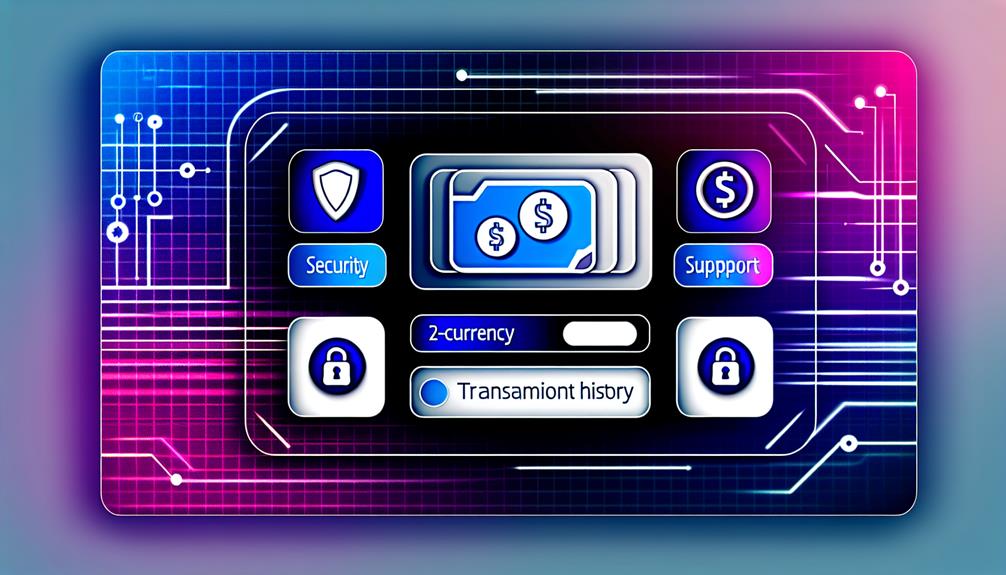Think of a crypto wallet as your digital safe, where you can securely keep your valuable assets. It's essential for anyone looking to engage with cryptocurrencies, but many people find themselves puzzled by the different types and their functionalities. You might wonder what makes a wallet more suitable for your needs or how it can protect you from potential risks. Understanding these aspects can greatly impact your experience in the crypto space, so let's explore what a crypto wallet really entails.
Definition of a Crypto Wallet

A crypto wallet serves as a digital tool that allows you to store, send, and receive cryptocurrencies securely. Think of it as your digital bank account, but instead of fiat currency, it holds your digital assets. Understanding the definition of a crypto wallet goes beyond just knowing that it stores crypto; it also encompasses the security measures and user experience that come with it.
When you choose a crypto wallet, crypto wallet security is vital. The wallet's architecture determines how safe your private keys are, which are fundamental for accessing your cryptocurrencies. Hardware wallets, for instance, provide an extra layer of security by keeping your keys offline, while software wallets can be more convenient but may be vulnerable to cyber threats. As a result, evaluating the security features of a wallet is important for protecting your investments.
Another vital aspect is wallet user experience. A well-designed wallet should be intuitive, allowing you to easily navigate through various functions like sending or receiving funds. If a wallet is cumbersome or confusing, it can lead to mistakes that might compromise your assets. Additionally, the speed of transactions and customer support availability also play a role in enhancing user experience.
Types of Crypto Wallets
When exploring types of crypto wallets, you'll find two primary categories: hot wallets and cold wallets. Hot wallets are connected to the internet, offering convenience for quick transactions, while cold wallets provide enhanced security by keeping your assets offline. Understanding the differences between these options is essential for managing your cryptocurrency effectively.
Hot Wallets Overview
Hot wallets, designed for convenience and ease of access, are vital tools for anyone engaging in the world of cryptocurrency. These wallets connect to the internet, allowing you to quickly buy, sell, and trade digital assets. The primary advantage of hot wallets is their transaction speed; you can execute trades almost instantly, which is significant in the volatile crypto market.
However, while hot wallets offer remarkable usability, they come with inherent risks. Because they're online, they're more vulnerable to hacks and cyber attacks than their offline counterparts. To mitigate these risks, you should implement robust security measures, such as two-factor authentication (2FA) and strong, unique passwords. Regularly updating your software can also help protect your assets.
It's important to note that hot wallets are best suited for short-term trading or daily transactions. For long-term storage, you may want to weigh a more secure option. Ultimately, the choice of a hot wallet should align with your trading habits and risk tolerance, ensuring you balance convenience with the necessary security for your digital assets.
Cold Wallets Explained
Many cryptocurrency enthusiasts turn to cold wallets for secure long-term storage of their digital assets. These wallets are not connected to the internet, which greatly enhances their security measures against hacks and unauthorized access. Cold wallets come in various forms, such as hardware wallets and paper wallets, offering diverse storage options tailored to user preferences.
When using a cold wallet, you'll find some accessibility factors at play. While they provide superior security, accessing your assets for transactions can be less convenient than hot wallets. Transaction processes may involve multiple steps, from connecting the hardware to your computer to entering PIN codes. User interfaces are often less intuitive, requiring some technical understanding, particularly for beginners.
Recovery methods are vital; most cold wallets provide backup solutions to recover your assets in case of loss or damage. Integration capabilities with various cryptocurrencies can vary, so it is important to choose a wallet that supports the coins you plan to store. By weighing these aspects, you can make an informed decision that balances security and usability, ensuring your digital assets remain safe yet accessible when needed.
Hot Wallets Explained

Hot wallets are digital wallets that are connected to the internet, allowing for quick access to your cryptocurrencies. While they offer the convenience of easy transactions, they also come with significant risks, such as exposure to hacking and theft. Understanding the balance between their benefits and vulnerabilities is essential for anyone managing digital assets.
Definition of Hot Wallets
In the domain of cryptocurrency, hot wallets refer to digital wallets that are connected to the internet, making them easily accessible for transactions. These wallets allow you to send, receive, and manage your cryptocurrency swiftly, but they come with certain considerations regarding wallet security and wallet compatibility.
Here are three key aspects of hot wallets:
- Convenience: Since they're online, you can access your funds from anywhere, making them ideal for frequent traders or those who need quick access to their cryptocurrency.
- Integration: Hot wallets often support a wide range of cryptocurrencies, enhancing wallet compatibility. This means you can manage multiple assets without needing separate wallets for each.
- Security Risks: While hot wallets are user-friendly, they're also more vulnerable to hacking and cyber threats. It's crucial to implement strong security measures, like two-factor authentication, to protect your assets.
Benefits and Risks
While using a hot wallet can greatly enhance your trading experience due to its convenience, it is vital to weigh the benefits against the inherent risks. One significant advantage is improved user experience; hot wallets allow for quick transactions, essential for active traders. However, this convenience comes at a cost, often resulting in higher transaction fees compared to cold wallets.
Security measures in hot wallets are typically robust, yet they are not infallible. The online nature makes you susceptible to hacks, raising privacy concerns that you must consider. Additionally, wallet recovery options may vary—some wallets offer seamless recovery while others can complicate asset management if you lose access.
Another consideration is wallet integration. Many hot wallets are compatible with various exchanges and decentralized applications, making them versatile tools for managing your digital assets. However, compatibility issues can arise, limiting your options. Ultimately, while hot wallets provide excellent accessibility and functionality, balancing these benefits with the security risks is essential. Adopting best practices, like enabling two-factor authentication, can mitigate some threats, but vigilance remains vital in the ever-evolving crypto landscape.
Cold Wallets Explained
When it comes to securing your cryptocurrency, understanding cold wallets is essential. Cold wallets are offline storage solutions designed to protect your digital assets from online threats. Unlike hot wallets, which are constantly connected to the internet, cold wallets provide an extra layer of security by keeping your private keys offline. This notably reduces the risk of hacking and theft.
Here are three key aspects of cold wallets you should know:
- Hardware Security: Cold wallets often come in the form of hardware devices, like USB sticks or dedicated hardware wallets. These devices store your private keys in a secure environment, making it nearly impossible for hackers to access them remotely.
- Physical Backup: Cold wallets can also be paper wallets, where you print your keys on paper. This method requires careful handling to avoid damage or loss, but it offers a completely offline option for storing your cryptocurrency.
- Wallet Recovery: Most cold wallets include recovery options, such as seed phrases or backup codes. In case you lose access to your device, these recovery methods guarantee you can regain control of your assets, provided you store them securely.
Understanding these elements can help you make informed choices about how to protect your investments. By using cold wallets, you're taking notable steps toward enhancing your cryptocurrency's security and guaranteeing its long-term safety.
Key Features of Crypto Wallets

Crypto wallets come equipped with a variety of key features that cater to different user needs and preferences. Understanding these features can help you choose a wallet that aligns with your security and usability requirements.
One primary feature is security measures. Most wallets use encryption, biometric authentication, or two-factor authentication to protect your assets. The level of security can vary greatly between hot and cold wallets, with cold wallets generally offering higher protection against online threats.
Another important aspect is wallet recovery. In the event you lose access to your wallet, recovery options are essential. Many wallets provide a recovery phrase or seed phrase, which allows you to regain access to your funds. It's critical to store this information securely, as anyone with access to it can control your assets.
Here's a breakdown of some essential features to keep in mind when choosing a crypto wallet:
| Feature | Hot Wallets | Cold Wallets |
|---|---|---|
| Security Measures | Moderate (encryption, 2FA) | High (offline storage) |
| Wallet Recovery | Seed phrases, cloud backup | Seed phrases only |
| Usability | User-friendly, accessible online | May require technical know-how |
| Cost | Typically free to use | Often requires an upfront cost |
Importance of Using Crypto Wallets
Choosing the right crypto wallet goes beyond just understanding its features; it's about recognizing the essential role these wallets play in managing and securing your digital assets. A well-chosen wallet not only enhances your user experience but also guarantees that your investments are adequately protected through robust security measures.
Here are three key reasons why using a crypto wallet is fundamental:
- Security: Crypto wallets provide various security measures, such as multisig functionality and backup strategies. These features guarantee that only designated individuals can access your assets, minimizing the risk of unauthorized transactions.
- Cost Efficiency: Different wallets have varied transaction fees. By selecting a wallet with favorable fee structures, you can optimize your costs, especially if you're making frequent transactions. This can greatly impact your overall returns on investment.
- Integration: Many crypto wallets offer wallet integration with decentralized applications (dApps) and exchanges. This integration simplifies the process of buying, selling, or trading cryptocurrencies, making it more convenient for you to manage your portfolio.
Moreover, effective storage solutions and recovery options are critical. If you lose access to your wallet, the ability to recover your funds can be a lifesaver. As a result, understanding the importance of using crypto wallets is not just about security; it's about guaranteeing a seamless, efficient, and protected investment journey. Investing time in choosing the right wallet can greatly enhance your experience in the crypto space.
Frequently Asked Questions
Can I Use Multiple Crypto Wallets Simultaneously?
Yes, you can use multiple wallets simultaneously. Different wallet types enhance transaction management, allowing you to segregate assets, optimize security, and streamline your crypto activities. Just guarantee you keep track of each wallet's keys and transactions.
How Do I Recover a Lost Crypto Wallet?
Losing a crypto wallet feels like misplacing a treasure map. To recover it, you'll need your private keys or a wallet backup. Without these, finding your way back to your assets might be an uphill battle.
Are Crypto Wallets Safe From Hacking?
Crypto wallets aren't immune to hacking risks; their security largely depends on your practices. Using strong passwords, two-factor authentication, and keeping software updated can greatly enhance wallet security and reduce potential vulnerabilities to hackers.
What Happens if My Wallet Provider Shuts Down?
If your wallet provider shuts down, it's like losing a trusted bridge. You'll face wallet provider risks, but explore recovery options like backups or transferring assets to a new provider to safeguard your investments.
Can I Store Multiple Cryptocurrencies in One Wallet?
Yes, you can store multiple cryptocurrencies in one wallet if it offers multi-currency support. Different wallet types, like hardware or software wallets, vary in their capabilities, so choose one that meets your needs effectively.
Conclusion
In summary, using a crypto wallet is absolutely essential for anyone traversing the digital currency landscape. Whether you opt for a hot wallet for instant access or a cold wallet for maximum security, these tools are your lifeline in managing cryptocurrencies. Without a reliable wallet, you're fundamentally trying to swim through a sea of digital assets without a life jacket—it's just too risky. Embrace the importance of safeguarding your investments with the right crypto wallet today!
